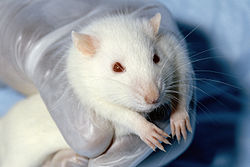Animal testing: Difference between revisions
CSV import Tags: mobile edit mobile web edit |
CSV import |
||
| Line 35: | Line 35: | ||
{{Ethics-stub}} | {{Ethics-stub}} | ||
{{Science-stub}} | {{Science-stub}} | ||
<gallery> | |||
File:Wistar_rat.jpg|Animal_testing | |||
File:An_Experiment_on_a_Bird_in_an_Air_Pump_by_Joseph_Wright_of_Derby,_1768.jpg|Animal_testing | |||
File:One_of_Pavlov's_dogs.jpg|Animal_testing | |||
File:Drosophila_melanogaster_-_front_(aka).jpg|Animal_testing | |||
File:Sleep-deprivation-flowerpot-technique-jepoirrier.jpg|Animal_testing | |||
File:Beagle_600.jpg|Animal_testing | |||
File:Danio_rerio_lab_left.JPG|Animal_testing | |||
File:Chimpanzee_Enos_before_the_flight_of_Mercury-Atlas_5.jpg|Animal_testing | |||
File:77-cm_primate_cage.jpg|Animal_testing | |||
File:Animaltesting.svg|Animal_testing | |||
File:Muizenkooi_met_houten_muizen_(3).JPG|Animal_testing | |||
File:Frog_vivisection.jpg|Animal_testing | |||
</gallery> | |||
Latest revision as of 12:14, 18 February 2025
Animal testing, also known as animal experimentation, animal research, and in vivo testing, is the use of non-human animals in experiments that seek to control the variables that affect the behavior or biological system under study. This approach can be contrasted with field studies in which animals are observed in their natural environments or habitats.
History[edit]
The history of animal testing goes back to the writings of the Ancient Greeks in the 4th and 3rd centuries BCE, with Aristotle (384–322 BCE) and Erasistratus (304–258 BCE) among the first to perform experiments on living animals.
Types of animal testing[edit]
There are several types of animal testing used in the world today. These include:
- Toxicity testing: This is used to examine the effects of various substances on different types of animals to determine their toxicity levels.
- Pharmacological testing: This involves testing new drugs on animals to determine their efficacy and safety before they are approved for human use.
- Genetic modification: This involves altering the genes of animals to create models of human diseases.
Ethical considerations[edit]
The ethical considerations of animal testing are a subject of intense debate. Critics argue that it is cruel and inhumane, while proponents argue that it is necessary for the advancement of medical and scientific research.
Alternatives to animal testing[edit]
There are several alternatives to animal testing, including in vitro testing, computer modeling, and human patient simulators. These alternatives are often less expensive and more accurate than animal testing.
See also[edit]
- Animal rights
- Animal welfare
- Cruelty to animals
- In vitro testing
- Computer modeling
- Human patient simulators
References[edit]
<references />
| Animal testing |
|---|
 |
| Main articles |
| Testing on |
| Issues |
| Cases |
| Companies |
| Groups/campaigns |
|
| Writers/activists |
| Categories |
-
Animal_testing
-
Animal_testing
-
Animal_testing
-
Animal_testing
-
Animal_testing
-
Animal_testing
-
Animal_testing
-
Animal_testing
-
Animal_testing
-
Animal_testing
-
Animal_testing
-
Animal_testing













